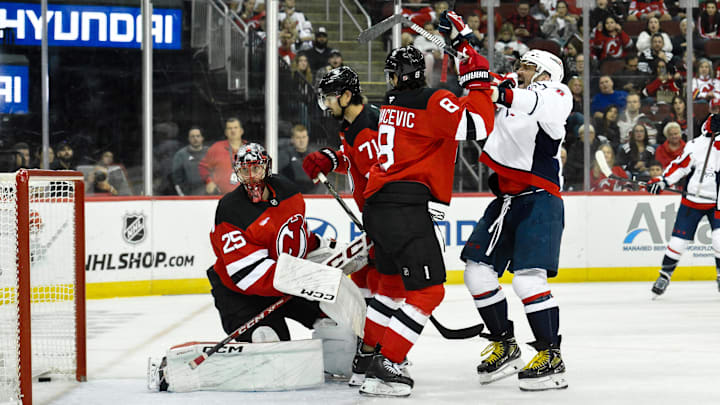Twice Saturday night, the New Jersey Devils came back from a two-goal deficit. Twice Saturday night, both the New Jersey Devils and Washington Capitals conceded consecutive goals, but it was the elusive final goal to complete a comeback that would’ve blown the roof off of Prudential Center. Unfortunately, this proved to be too much for the Devils.
The mistakes made by New Jersey proved to be too many. The Capitals proved to be too much and in the end, it only took one goal to seal the victory for the visiting team. The Devils would lose a very entertaining and stressful game 6-5, earning a point in the process. But, in a game where mistakes were made on both sides, what’s important for the Devils is not so much how the contest ended but how it started.
Saturday night’s game was not a prototypical slow start for the Devils as they would get the first goal of the game off an Erik Haula shot from a bad angle. However, it was a game that took a bit of time for New Jersey to match the Capitals' physicality, a physicality that played a role in the contest. Both teams combined for 72 hits on the night and had their legs from the get-go. In the first period, Washington took advantage of their size, protecting the puck very well in the offensive zone, resulting in a 3-1 lead and 17 shots on goal through the first twenty minutes of play.
Sheldon Keefe had to have made this a point during the first intermission because, at the start of the second period, the Devils came out with a pep in their step and an eye on finishing their checks no matter what. The uptempo physicality and hard forechecking led to consecutive Nico Hischier goals ten seconds apart. It was the fastest a New Jersey Devil player has ever come to score multiple goals in a game in Devils history. The captain’s heroics would tie the game at 3-3 and was only part of what made the game as wild as it was.
Although the Devils would relinquish the tie as the period progressed, going into the final frame down 5-3, it would be both Dawson Mercer and Dougie Hamilton bringing life back into the building and forcing overtime only to lose off what was a bad change and the only mistake of the game from the Devils Captain. In hockey, one mistake is all it takes to change everything, and, unfortunately, Nico Hischier’s bad line change led to the odd-man rush and the game-winning goal for Washington.
Now, Hischier's line change may have directly led to Tom Wilson's overtime goal, but the Captain's one mistake was not the reason for the Devils defeat on Saturday. It was a far from perfect game for most, if not all, Devils' players, and everyone involved knew it. Their inability to grasp hold of the game led to the loss. Again, what’s important is not so much how the game ended but how it started. Playing catch-up all night doomed New Jersey, and it’s something that cannot occur consistently.
The Devils are a very capable team, and they had many close opportunities to steal Saturday's game, even when they had no business getting anything out of yesterday’s game. But slow starts can plunge any team into the abyss and last night, in the words of Timo Meier, the Devils made it “real tough” on themselves. They had a slow start, then picked it up, then repeated what plagued them early on again and again. If that style of play continues, it will not bode well for the Devils because it just isn't sustainable. Yes, there were some rough bounces, but the rough bounces followed rough decisions and haphazard play and the coaches and players know it. New Jersey attempted to maintain their structured play from the start, but the Capitals pushed hard, and the Devils just didn’t have a consistent pushback, leading to breakdowns, missed coverages, and a loser’s point.
